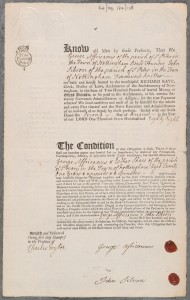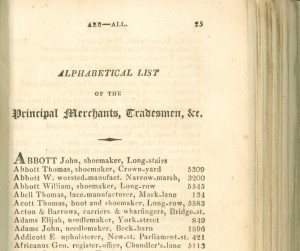
October 1, 2013, by Kathryn Steenson
Black History Month
To mark Black History Month, we’re focussing on one of Nottingham’s most famous black citizens; former slave turned entrepreneur George Africanus.
His date and exact place of birth are unknown, but he was about three years old when he was brought to England in 1766, where he became a servant to the Molyneux family in Wolverhampton. We do not know when or how he came to Nottingham, where he was settled as a free man in the 1780s, although the Molyneux family did have links with the county.
On 3 August 1788 he married Esther Shaw, a local girl who had been baptised at St Mary’s church in Nottingham in 1768. Marriages could only take place if banns were ‘published’ in the parish church on three consecutive weeks, or a couple had a licence granted by the appropriate ecclesiastical authority.
Marriage bonds are ‘application forms’ for people wishing to be married by licence. They were issued by the Archdeaconry Court of Nottingham and some 184 boxes of them survive in the Archdeaconry papers in Manuscripts and Special Collections.
George and Esther were one of the minority of couples who married by licence. On their marriage bond, dated the day before their wedding, both parties are listed as being 21 years or over. This was the age of majority, and people younger would require parental permission. George was recorded as a brass founder, but he did other work as well; by 1818 a local business directory lists him as running a servants’ register office on Chandlers Lane in Nottingham. His wife also appears sporadically in trade directories, as a milliner, under her own name.
In 1829 George bought substantial property in Chandlers Lane which included two other properties let out to tenants. Property ownership granted George the right to vote in parliamentary elections, a right that only 1 in 7 men had at that time. He seemed to take part in community life; in 1816 he was included on a list of special constables who were responsible for ‘watching and warding’ the local streets to protect their property and others’ during times of social unrest.
George died in 1834, aged 71 years, and was buried in St Mary’s churchyard in Nottingham on 25 May. He was survived by his wife Esther (who died in 1853), their daughter Hannah and grand-daughter Sarah.
A plaque was erected at St Mary’s churchyard in 2003 in memory of Nottingham’s ‘first black entrepreneur’.
Manuscripts and Special Collections holds marriage bonds from the Archdeaconry Court of Nottingham from 1594 to 1884, and the indexes to them dating 1771-1790 and 1801-1884 are available to search online. As most couples were married by banns, the Archdeaconry archive does not include records relating to the great majority of Nottinghamshire marriages.
There are several different types of trade directories, but essentially they list the names and addresses of various tradesmen, businesses, and private residents who wished to be included. Often there are details of the infrastructure, public amenities and history of the town. The East Midlands Collection contains an incomplete set of the various trade directories, including Kelly’s, Glover’s and Wright’s, spanning the eighteenth to early twentieth centuries. They are available for the whole East Midlands region, not just Nottinghamshire.
To see these, or the other archives and special collections we hold, please contact us and make an appointment to visit our Reading Room on King’s Meadow Campus.



I found this posting interesting. Thanks for reminding us about George Africanus. Do we know if any of his descendants still live in Nottinghamshire?
Thanks for your comment, Val. As far as we know, there aren’t any descendants in Nottinghamshire. It seems his only grandchild to have children, Esther Africanus Cropper, was born in Nottingham several years after his death, but settled in London with her family after she married.
[…] other Black History Month news, you might want to have a look at this post on the Manuscripts and Special collections blog. It’s about George Africanus — a former […]
thanx for the post/ I would like to find out more about this fascinating man.